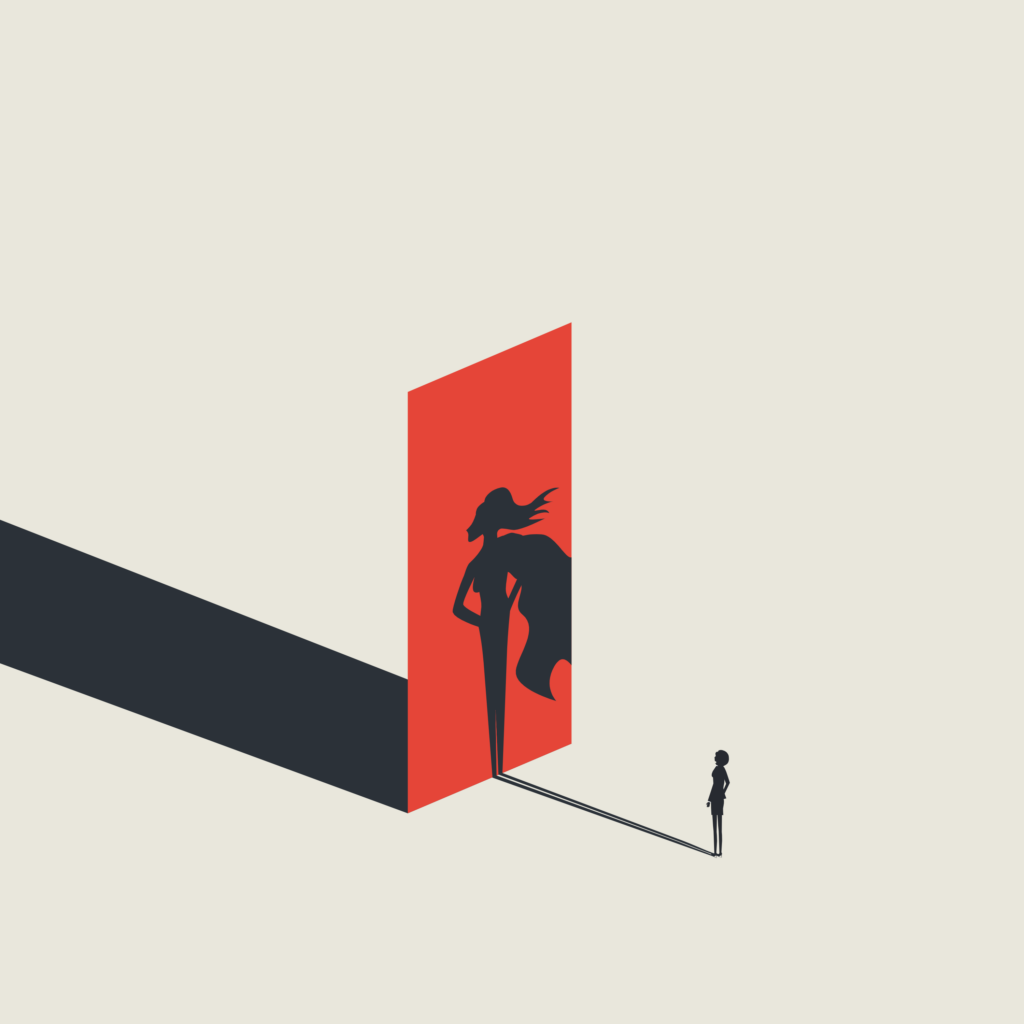By Geneviève Guité

This article is a summary of Episode #4 - Talent and Potential of my Bold Leadership podcast.
Those who know me know that I'm passionate about developing talent and potential. I believe in each individual's ability to develop, grow and achieve personal and professional fulfillment.
It's one of my favorite quotes, and a bit of inspiration for the topics I'm going to talk about today.
But just because you're talented doesn't mean you'll develop your full potential.
To develop your potential, you have to want to do it.
So I want to explore with you 5 characteristics of people who are champions of developing their potential.
1 - They have a growth mentality
The growth mindset, developed by Dr. Carol Dweck in her book Mindset, explains how our state of mind influences our ability to develop, and that talent and skills are not the only elements that define our ability to develop our full potential.
For people with a fixed mindset, what talent or intelligence I have now defines my potential. The consequence is that they may plateau earlier and not reach their full potential.
For people with a growth mindset, what I learn (academically or in life in general) will define my potential and that intelligence can be developed.
They have a desire to learn and therefore a tendency:
- Learn from criticism and feedback
- A willingness to take on challenges and solve problems
- To persevere in the face of setbacks and difficulties
- To see effort and work as the path to mastery of the skill
As a result, they achieve a higher level of success, and are more likely to maximize their potential.
For people with a fixed mindset, immediate success without too much effort is important, which can prevent them from taking on challenges for fear of facing failure.
Society in general tends to value immediate, effortless success - after all, if you're talented, it should be easy.
Michael Jordan and the growth mindset
Dr. Dweck describes Michael Jordan as the perfect example of someone with a growth mindset. Little Michael, wasn't particularly gifted when he started playing basketball in high school: he was small and even the team coach thought he had no talent. Today, Michael Jordan is the greatest professional athlete of all time, and probably the one who worked the hardest to reach his level of excellence. A kid with a fixed mentality would probably have given up basketball.
Successful people have a special talent for turning life's difficulties into successes later in their careers. Failure doesn't define them.
What does a growth-minded leader or manager look like?
These managers are dedicated to the development of their employees and see talent as just the beginning of something. People with a growth mindset know that it takes time for potential to blossom.
In contrast, managers with a fixed mindset will recognize the talent they see today, and judge their employees as talented or not. They will offer very little coaching or development, and will keep their initial impression. This type of manager also tends to develop managers who will, in turn, have this type of mentality.
2 - They have GRIT
Grit, as described by Angela Duckworth in her book GRIT, The Power of Passion and perseverance, is the combination of passion, perseverance and guts. The ability not to give up when it's really hard.
What Angela Duckworth says is that talent, and being gifted, is not the only factor that defines potential.
She writes that we even have a bias, and let ourselves be distracted by talent, instead of looking at or evaluating other aspects such as Grit, which is a much better indicator of an individual's future potential.
People with Grit will perceive the failures, obstacles or difficulties they encounter as a source of learning.
3- They have GUTS
Athletes with GUTS have heart, courage, determination and guts.
And a talented athlete without GUTS has very little chance of becoming a great champion. Steve Prefontaine, who is arguably considered the greatest American long distance runner, had a reputation for having his heart in his belly and always pushing himself to the maximum of his abilities and many of his quotes are inspiring:
And when you don't put in the effort, you always have an excuse when you don't succeed.
To have GUTS is to make the choice to be uncomfortable in order to give the best of ourselves.
4- They're out of their comfort zone
You couldn't talk about developing potential without talking about getting out of your comfort zone.
I really like The Law of the Rubber Band, by John C. Maxwell in his book The 15 Invaluable Laws of Growth: Apply them and reach your full potential. A rubber band that is not taut is useless. It's the same for our development, if we stay in our comfort zone, we stagnate.
The 4 zones
Zone 1 - The comfort zone
It makes you feel safe and in control. People with a growth mentality are less tolerant of staying in this area. It takes Guts to dare to move to the next zone.
Zone 2 - The zone of fear
We lack confidence, we let ourselves be influenced by what others think and it's uncomfortable. It is this area that will hold fixed mentalities for fear of facing difficulties to overcome, and sometimes failure.
Zone 3 - The Learning Zone
We manage new challenges, develop new skills, expand our comfort zone (and the good news is that we never go back, unlike the rubber band). And it takes FREE to persist.
Zone 4 - The growth zone
You find meaning in what you're doing, you grow and define new goals, and the cycle starts all over again.
5 - They face the DIP
When you have Grit, GUTS, a growth mentality and you push yourself to the maximum of your abilities... it's going to happen that you'll end up in the DIP.
I told you about my coaching certification journey in episode #1 of my podcast. Part of the certification pathway consists of 26 weeks of group learning, with supervision sessions, etc.
And every week, there's new material to read and listen to. In week #13, the module to listen to is called The DIP. We were warned that it would happen, some before, some a little later, but we'd all go through it.
I remember so much how I felt. I'd come to the conclusion that coaching wasn't for me after all, and that maybe I should think about moving on. I remember the enormous good that listening to this recording had on me at that very moment. Twenty minutes in which Karen Kimsey-House, co-founder of CTI, talks about DIP.
I wanted to check whether my memory was correct, or whether I'd romanticized my experience of seven years ago. But no! Listening to this recording again, I reconnected with the power of DIP.
The feeling of failure, of not being able to do it and of feeling momentarily, completely incompetent, is natural and essential to any profound learning process. We are in an area of great vulnerability. It's a tunnel, and we have to go through it.
We're in skill area #2 - I know what I don't know, and it's not comfortable at all, in fact, it's a difficult and confrontational experience.
And we can't develop our full potential if we don't put ourselves in this situation of great discomfort.
And what Karen Kimsey-House is telling us is that we need to familiarize ourselves with this discomfort in order to develop our resilience and continue to grow.
She asks us the following two questions:
- What's in this place for me?
- What's the value of learning?
Karen also talks about what to do when you're in the DIP:
- Focus our attention on the meaning we give to this exercise
- Showing compassion to ourselves
- Demonstrate integrity and ask yourself whether you did what you were supposed to do and whether you prepared properly
- Asking for help and support when things go wrong
Going through experiences like these, if we don't already have a growth mindset, can definitely help us develop it. If what we accomplish is part of something that makes sense to us, anything is possible.
CONCLUSION
As a leader, if we want to maximize our impact on the world around us, we need to develop our own potential to the full. For our role is also to train, coach, mentor and help those around us to develop theirs. And this process is essential to keep the leadership wheel turning.
When we share our passion, our experiences, our mistakes and our successes, we continue to learn and broaden our horizons. And the whole process of sharing and transferring knowledge is, in itself, a process that takes us out of our comfort zone, because it requires heart, humility and vulnerability. Mentoring is the perfect example of the generosity and reciprocity of this kind of development process.
The development of our potential is our life's work, and it is never finished. And don't forget, as John Maxwell puts it so well: "Growth stops when you lose the tension between where you are and where you could be".
See you soon!




